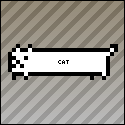|
Neurozys posted:http://en.wikipedia.org/wiki/Binary_to_text_encoding
|
|
|
|

|
| # ? Jun 3, 2024 14:45 |
|
Neurozys posted:http://en.wikipedia.org/wiki/Binary_to_text_encoding Wait... You're telling me I can get things other than discussions from usenet? That'd be a great way to distribute open source stuff like linux ISOs.
|
|
|
|
Ramzi posted:Alright. In my mind when I think text I think ASCII. I have no prefence for ASCII, just the idea. I'll try this. edit: how much do you want it changed? do you want it to only use the letters? FlyingDodo fucked around with this message at 06:59 on Jun 5, 2007 |
|
|
|
I've written the program (although the text file it outputs is 2x the size of the original). Except I can't work out what I'm supposed to do on tinyappz.com.
|
|
|
|
I have a funky request. I don't know if this qualifies for "tiny" but hell it's worth a shot: Premise: a system tray shoutcast audio player. Possible features (besides playing a stream): 1. Popups with current song/artist info 2. "Global Hotkeys"-like feature (Just for Play/Stop) 3. Ability to play/stop by clicking the task icon. 4. Any settings (stream URL, buffer, popups on/off) on a right click menu Probably a bit more work than you all are interested in, but I'm really just looking for a simple no-frills replacement for Winamp on shoutcast stream playing.
|
|
|
|
FlyingDodo posted:I've written the program (although the text file it outputs is 2x the size of the original). Except I can't work out what I'm supposed to do on tinyappz.com. 1. Create an account here http://tinyappz.com/index.php?title=Special:Userlogin&type=signup (I don't care if you use real info or not, and there's no confirmation process) 2. Go to http://tinyappz.com/wiki/Special:Upload and upload a zip file containing your project. 3. Go to http://tinyappz.com/wiki/Add_Application Fill out as much information as you have and hit the 'Add New Application' button. For the "File (must upload)" field use the name of the file you just uploaded. 4. You'll be brought to a new page for your app. Edit any more information you want to provide into it just like any wiki. TinyAppz.com main page posted:Filling Requests
|
|
|
|
I hope I did everything right and I hope this program does what was wanted. http://tinyappz.com/wiki/BinaryText
|
|
|
|
Thank you. Why only A-Q, though?
|
|
|
|
FlyingDodo posted:I hope I did everything right and I hope this program does what was wanted. Well, the page is fine (a lot better then most of them come out at first) I did a couple minor edits, just shortened the description and removed the source file link, since it was the same file as the exec. I just realized I haven't contributed an app in quite a while . . . I should probably do one sometime.
|
|
|
|
Ramzi posted:Thank you. Why only A-Q, though? It splits the bytes into two bytes, only 4 bits are stored in each of the two bytes. So each one of those half bytes can only store 0 - 15. Then it adds add on 65 so that all the values will appear as letters when opened as a text file. So each byte in the text file will only store something in range from 65 - 80, which are the letters A through Q.
|
|
|
|
Could've used base64 
|
|
|
|
I'd like a program that temporarily disables my keyboard so that when I spill something on it I can wipe down all the keys without accidentally causing stuff to happen on screen. http://www.tinyappz.com/wiki/Request:1181241385
|
|
|
|
Dicky B posted:I'd like a program that temporarily disables my keyboard so that when I spill something on it I can wipe down all the keys without accidentally causing stuff to happen on screen. I was about to do it but when I searched for a method of disabling the keyboard this came up http://www.dirfile.com/clean_n_go.htm
|
|
|
|
Neurozys posted:I was about to do it but when I searched for a method of disabling the keyboard this came up http://www.dirfile.com/clean_n_go.htm
|
|
|
|
Dicky B posted:I'd like a program that temporarily disables my keyboard so that when I spill something on it I can wipe down all the keys without accidentally causing stuff to happen on screen. Does this happen frequently enough that you need something to automate it? Also, what is wrong with unplugging it?
|
|
|
|
kaniff posted:Does this happen frequently enough that you need something to automate it?
|
|
|
|
Ramzi posted:Alright. In my mind when I think text I think ASCII. I have no prefence for ASCII, just the idea. UUEncode, yEnc, etc. are ASCII. Dude, you're trying to reinvent the wheel.
|
|
|
|
I doubt anyone cares, but some unidentified person asked me over AIM to add a feature to Random Opener (to be able check subdirectories.) So I rewrote it in C#, since it's been so many months since I've used MFC that I couldn't get the original code to do what I wanted. Anyway, new version here - http://www.tinyappz.com/wiki/Random_Opener
|
|
|
|
kaniff posted:Does this happen frequently enough that you need something to automate it? This would've been useful to me until I learned to move the bong AWAY from the keyboard during use.
|
|
|
|
Cool Matty posted:I have a funky request. I don't know if this qualifies for "tiny" but hell it's worth a shot: Years ago, I wrote a system tray media player, with Shoutcast support. It has a stay-on-top optionally transparent window with current song info, but it's a bit buggy. Ask fellow goon Scorponok as he also used to use it. It also has context menu-based file browsing, supports all the same files as Windows Media Player (via DirectShow) and nice scrolling text. It already satisfies requirement 3, possibly 1 (static window okay?), plenty of options on 4, only really needs bugfixing plus 2. If anybody was interested I could probably release the source or something, so it could be fixed and updated freely. I initially had the notion of selling it as shareware but decided against it, despite me still using it now. It's not a tiny app by any means. Edit: Oh, screenshots! http://mice-software.com/blah/trayplay.jpg http://mice-software.com/blah/trayplay2.jpg http://mice-software.com/blah/trayplay3.jpg These are all old, pre-Shoutcast support I think. Charles Ford fucked around with this message at 12:33 on Jun 8, 2007 |
|
|
|
I don't know how 'tiny' this program would be because I have no idea how difficult it would be to make. But the task it needs to do is pretty simple. In a nutshell: A program that automatically visits particular webpages and downloads particular files from them to a particular directory. Why: I want to be able to download a large number of .torrent files simultaneously while exerting as little effort as possible (currently, I have to click each one in turn, on a huge list, which is horribly tedious) I would like the program to do the following. I'm going to try and be as clear as possible, but if anything is confusing or I have left out a critical piece of information the program would need, please do tell me: 1. The program opens a text file (which is in the same directory) called "urls.txt", which contains a list of URLs. 2. It visits the first URL, and searches the webpage code for URLs of this format: http://www.bt-chat.com/download.php?info_hash=XXXX Where XXXX is any alphanumeric 40-character string. 3. It then visits each and every one of those URLs, each one initating a download of a torrent file. However, the program should never visit the same URL twice, so it needs to remember the XXXX's it has already visited (by saving them to a file, so it remembers them every time the program is run) 4. It puts all these torrent files in a particular directory (perhaps this directory is the first list item in urls.txt? that would make it easy to customise) 7. The program then moves onto the next list item and repeats, and then closes after the last list item. Ideally it would also automatically open all the files it downloads, in the default program, but that's not an essential aspect. In fact, it doesn't really have to save the torrent files. If it can just initiate the downloads, then I can just click repeatedly in Firefox to accept them all.
|
|
|
|
Neurozys posted:I doubt anyone cares, but some unidentified person asked me over AIM to add a feature to Random Opener (to be able check subdirectories.) So I rewrote it in C#, since it's been so many months since I've used MFC that I couldn't get the original code to do what I wanted. That was me. Thank you very much!
|
|
|
|
Run posted:I don't know how 'tiny' this program would be because I have no idea how difficult it would be to make. But the task it needs to do is pretty simple. https://addons.mozilla.org/en-US/firefox/addon/201 You just need to actually visit the page, then it will remember the filtering and automatically get all the torrent files.
|
|
|
|
Requesting a tool that pops a balloontip in the tray everytime someone accesses a network shared file!
|
|
|
|
DLCinferno posted:Almost everything you're requesting is already done in a firefox extension: I gave it a try and that's pretty nifty, but it doesn't remember which ones it's already gathered, which is a rather crucial aspect of what I'm after. Still, thanks for the link - I'll find that addon useful elsewhere regardless
|
|
|
|
Something I thought of the other night: The what: A screensaver that will look in a user-defined directory and play back either all video files in that directory or one selected file. Now, the bit that all the other video screensaver programs don't do; it should pick a random point within the video file, and play from there, looping back to the start of the file seamlessly. It should also have a mute checkbox, and a slider (or other option) to fade brightness of the video from full down to 10% The why: I've ripped my copies of Koyaanisqatsi, Powaqqatsi, Baraka and Chronos to 2CD avis from the DVDs, and I'd love to be able to get a random scene from one of them playing if I leave the pc for a while. Note; I'm running XP Pro at the moment, but may be shelling out many clams for a MacBook Pro in the future, so any Mac tinkerers who want to have a shot, feel free 
|
|
|
|
heeen posted:Requesting a tool that pops a balloontip in the tray everytime someone accesses a network shared file! I'd be quite interested in this as well.
|
|
|
|
One of my big pet peeves is that all the programs in the startup folder try to start at the same time. They usually end up slowing each other down to the point where a system is unusable for the first few minutes. I'd like a program that would keep track of the shortcuts, and launch them at a particular time, so that their launch is staggered over an adjustable period of time. A windows application that does the following: 1. Starts at system startup (startup folder is just fine here) 2. Finds any shortcuts to applications that will start at startup 3. Moves them into a folder and creates an entry in the INI file, possibly throwing up a window to ask you for the length of that time for the shortcut 4. Maintains an INI of shortcuts, which you can use a miniature interface to set a time in seconds. This might best be done in an external program so it doesn't quit with the rest of the program. 5. It runs a countup timer, when it reaches a shortcut's particular time, it will launch that shortcut 6. After it finishes the last task, it exits itself. http://www.tinyappz.com/wiki/Request:1181950095
|
|
|
|
I'm probably going to be doing massive amounts of databasing in the future... so unless someone has a better alternative that picking stuff off the web and putting it into a CSV file myself, I'd like to hear it. Until then, I'd very much appreciate it if someone could make this app: I don't need it to translate anything, really. I will edit/monitor the files before I feed them. I just need the program to take the tab-separated values (which are in rows) and turn them into columned CSVs. For example: Before [there are tabs here but they do not translate] quote:AGP Slots None After: quote:None,1,2,3 The challenge, maybe: I run Linux.
|
|
|
|
ijustam posted:I don't need it to translate anything, really. I will edit/monitor the files before I feed them. I just need the program to take the tab-separated values (which are in rows) and turn them into columned CSVs. For example: I'd say use a Perl script. Something along the lines of: code:Sizzlechest fucked around with this message at 04:19 on Jun 17, 2007 |
|
|
|
Sizzlechest posted:I'd say use a Perl script. Something along the lines of: All of the rows will be read. I will delete unnecessary rows before entry. The number of columns is varied between files. Edit: I understand your code, except for this: ( $array[$i++] ) = /^.*?\t.*?\t(.*?)$/; Could you explain to me what this does? ijustam fucked around with this message at 04:37 on Jun 17, 2007 |
|
|
|
ijustam posted:All of the rows will be read. I will delete unnecessary rows before entry. The number of columns is varied between files. It's a regular expression to ignore all but the third column since that's the example you gave. I rewrote it to do a true transpose on any tab-delimited input and yield a CSV output: code:Sizzlechest fucked around with this message at 04:55 on Jun 17, 2007 |
|
|
|
Sizzlechest posted:Since the input was tabbed, do you need to worry about commas in the data? How would you like them escaped? If there's a comma in the input, it probably shouldn't be in there to begin with. If it errors and halts that's probably a good thing. It's going to be fed into a SQL database, so unless \n won't work with SQL (which I don't know why it wouldn't but I'm not in charge of the massive coding, only the databasing), go ahead and use a standard return.
|
|
|
|
ijustam posted:If there's a comma in the input, it probably shouldn't be in there to begin with. If it errors and halts that's probably a good thing. The newline character is based on the OS you are using. If you are using Linux, the newline will be a linefeed. On DOS, it's a carriage return AND linefeed. On a MAC, it's a carriage return only. Feel free to use a "\015" if it makes you happy. However, if you run this on DOS, the output will be in Linux (Unix) format only. I added comments to the code: code:
|
|
|
|
Sizzlechest posted:The newline character is based on the OS you are using. If you are using Linux, the newline will be a linefeed. On DOS, it's a carriage return AND linefeed. On a MAC, it's a carriage return only. Feel free to use a "\015" if it makes you happy. However, if you run this on DOS, the output will be in Linux (Unix) format only. I added comments to the code: code:Also, is there a way to have to recognize a separator, such as "--Null--" and have it finish that array and continue to another? I ask this so I can mash a lot of data into one file instead of a million small files.
|
|
|
|
ijustam posted:So far this is absolutely awesome. I only have two questions; this is my output: So you literally only want the last column of the original tab delimited file as a single row of CSV data? If so, that ought to be easy. You don't need the outer loop. Just use the last column: code:ijustam posted:Also, is there a way to have to recognize a separator, such as "--Null--" and have it finish that array and continue to another? I ask this so I can mash a lot of data into one file instead of a million small files. Probably, but I'd need to see an example.
|
|
|
|
Sizzlechest posted:Probably, but I'd need to see an example. Here is the current file: quote:Brand Western Digital Ideally it would go like this: quote:Brand Western Digital
|
|
|
|
Oh, so you want to process multiple files. Each row in the output is the last column from each file in CSV format, yes? Here you go: code:code:
|
|
|
|
Sizzlechest posted:Oh, so you want to process multiple files. Each row in the output is the last column from each file in CSV format, yes? You're close. The output is perfect, however, I want it to read one file with multiple sets of data. I want the program to see a certain character, output what it has, and begin again from where it stopped. Here is our example source file: quote:Brand Western Digital The program would read the first set of data, and when it hits our separator (%%%%NEW%%%%) it will output the array and begin a new array consisting of the second set of data, then repeat for the third and fourth until it hits EOF. I apologize if I'm being a bit anal; you are doing me such a big favor and saving me so much time in the long run. Edit: Just realized the two example data sets aren't identical in syntax. Not a big deal but possibly a bit confusing (fixed). ijustam fucked around with this message at 06:03 on Jun 17, 2007 |
|
|
|

|
| # ? Jun 3, 2024 14:45 |
|
How's this? It only accepts one file and I used your "%%%%NEW%%%%" literally.code:
|
|
|






















